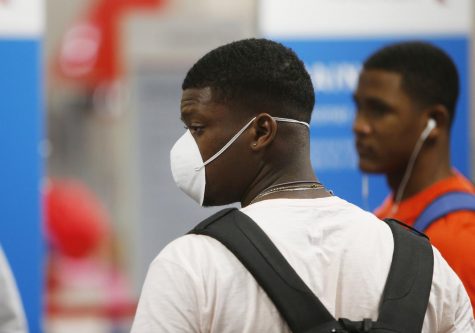COVID-19 Isn’t Racist, but America Systematically Is
Black people are disproportionally being diagnosed with COVID-19 due to the country’s legacy of systematic oppression.
PHOTO | MCT Campus
A passenger wears a face mask at a mostly empty Union Station railway station in Washington, D.C., due to the COVID-19 pandemic on Friday, March 20, 2020. (Photo by MCT Campus)
Fifty percent of people testing positive for coronavirus in Kansas City are black, although they only make up 30% of the population. This is following the national pattern, as 40% of all COVID-19 deaths are African Americans. As more data continues to emerge, it is likely that African Americans will be hit much harder than any other race.
In Michigan, black people make up 15% of the state population but represent 50% of the people deceased due to the virus. In Louisiana, black people make up one-third of the population but 70% of COVID-19 deaths. Similarly in Missouri, black people make up 12% of the population but represent 40% of the people diagnosed, according to Black Demographics. The list goes on as the majority of the states that have reported data continue to follow this trend.
For a variety of reasons, including that many of the lower-wage jobs that have been declared “essential” by state and local governments have a high representation of African Americans, crowded living conditions, and decreased access to health care, it doesn’t seem like a coincidence that black communities are the demographic being most infected.
Because of the historical legacy of Redlining, residents of specific, most notably black, neighborhoods or communities lack access to healthy food spaces, safety and recreational facilities. Even now, President Donald Trump has rolled back dozens of environmental regulations that helped to maintain clean water and air supply and reduce the number of harmful carbon emissions. The link between air pollution and the fact that African American communities are much more likely to have high levels of contamination to air pollution could contribute to the COVID-19 fatality rates.
Additionally, people with severe illnesses like serious heart conditions, severe obesity, diabetes, chronic kidney disease, asthma and liver disease are at higher risk of getting the virus, according to the Centers for Disease Control and Prevention. This in conjunction with the fact that heart disease is the number one leading cause of death for African Americans, followed by diabetes as the fifth leading cause and kidney disease at number eight, further demonstrates the increased level of risk African Americans face.

Some states like New York have already begun to take action in response to newly released numbers. According to Gov. Andrew Cuomo, the state will begin to increase its testing in minority communities and conduct research on why New York is seeing these gaps.
President Trump has yet to centralize the country’s coronavirus response, arguing that each state should fend for itself, and only look towards the federal government as a last resort. But by taking action and taking the lead in managing the virus, the federal government would then be able to have a more holistic view of how various communities are affected, and would be able to better distribute their resources.
Many of the counties in Kansas City have failed to collect COVID- 19 data, with Johnson County being the only one to do so, according to the Kansas City Star. Kansas City Mayor Quinton Lucas has been a strong advocate for releasing data to the public in order to better inform the greater community. Poverty and race have always been fundamental causes of health disparities, but now more than ever facing a worldwide pandemic, it’s vital that federal and state governments become more active in testing our most vulnerable citizens: racial minorities.




